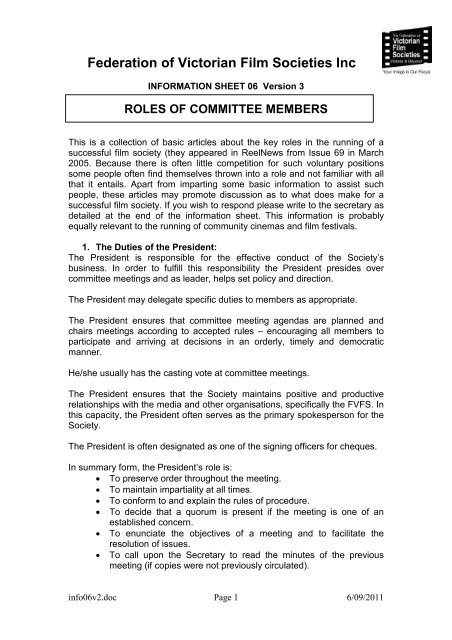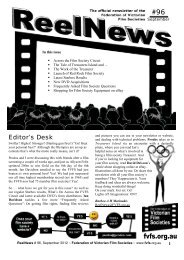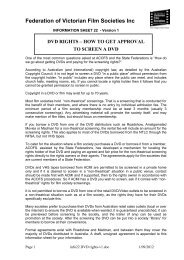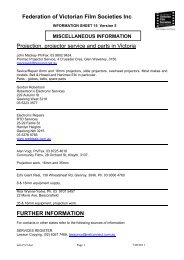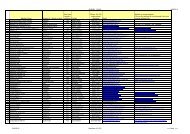Roles of Committee Members - Federation of Victorian Film Societies
Roles of Committee Members - Federation of Victorian Film Societies
Roles of Committee Members - Federation of Victorian Film Societies
You also want an ePaper? Increase the reach of your titles
YUMPU automatically turns print PDFs into web optimized ePapers that Google loves.
<strong>Federation</strong> <strong>of</strong> <strong>Victorian</strong> <strong>Film</strong> <strong>Societies</strong> Inc<br />
INFORMATION SHEET 06 Version 3<br />
ROLES OF COMMITTEE MEMBERS<br />
This is a collection <strong>of</strong> basic articles about the key roles in the running <strong>of</strong> a<br />
successful film society (they appeared in ReelNews from Issue 69 in March<br />
2005. Because there is <strong>of</strong>ten little competition for such voluntary positions<br />
some people <strong>of</strong>ten find themselves thrown into a role and not familiar with all<br />
that it entails. Apart from imparting some basic information to assist such<br />
people, these articles may promote discussion as to what does make for a<br />
successful film society. If you wish to respond please write to the secretary as<br />
detailed at the end <strong>of</strong> the information sheet. This information is probably<br />
equally relevant to the running <strong>of</strong> community cinemas and film festivals.<br />
1. The Duties <strong>of</strong> the President:<br />
The President is responsible for the effective conduct <strong>of</strong> the Society’s<br />
business. In order to fulfill this responsibility the President presides over<br />
committee meetings and as leader, helps set policy and direction.<br />
The President may delegate specific duties to members as appropriate.<br />
The President ensures that committee meeting agendas are planned and<br />
chairs meetings according to accepted rules – encouraging all members to<br />
participate and arriving at decisions in an orderly, timely and democratic<br />
manner.<br />
He/she usually has the casting vote at committee meetings.<br />
The President ensures that the Society maintains positive and productive<br />
relationships with the media and other organisations, specifically the FVFS. In<br />
this capacity, the President <strong>of</strong>ten serves as the primary spokesperson for the<br />
Society.<br />
The President is <strong>of</strong>ten designated as one <strong>of</strong> the signing <strong>of</strong>ficers for cheques.<br />
In summary form, the President’s role is:<br />
• To preserve order throughout the meeting.<br />
• To maintain impartiality at all times.<br />
• To conform to and explain the rules <strong>of</strong> procedure.<br />
• To decide that a quorum is present if the meeting is one <strong>of</strong> an<br />
established concern.<br />
• To enunciate the objectives <strong>of</strong> a meeting and to facilitate the<br />
resolution <strong>of</strong> issues.<br />
• To call upon the Secretary to read the minutes <strong>of</strong> the previous<br />
meeting (if copies were not previously circulated).<br />
info06v2.doc Page 1 6/09/2011
• To put to the meeting the question <strong>of</strong> confirming the minutes and if<br />
confirmed to sign them as President.<br />
• To announce the other business matters <strong>of</strong> the meeting in turn.<br />
• To accept motions and amendments if in order.<br />
• To put motions and amendments to the meeting.<br />
• In debate to confine speakers to time limits (where established).<br />
• To announce the method <strong>of</strong> voting.<br />
• To appoint scrutineers.<br />
• To decide points <strong>of</strong> order.<br />
• To explain matters in doubt.<br />
• To decide and announce the next speaker.<br />
• To introduce guests or public speakers.<br />
• At a social gathering to announce the proposers <strong>of</strong> toasts, the<br />
supporters and responders.<br />
• To call upon movers and seconders <strong>of</strong> votes <strong>of</strong> thanks. (Except a<br />
vote <strong>of</strong> thanks to the President).<br />
• To decide questions <strong>of</strong> adjournments.<br />
• To close the meeting.<br />
2. The Powers <strong>of</strong> the President:<br />
• To regulate the business and to control the behaviour <strong>of</strong> the<br />
members so that the objects <strong>of</strong> the meeting may be attained to the<br />
satisfaction <strong>of</strong> the majority <strong>of</strong> those present.<br />
• To regulate the order in which the business is to be dealt.<br />
• To settle points <strong>of</strong> order.<br />
• The President has the casting vote when the voting for and against<br />
is equal.<br />
• The President possesses the power <strong>of</strong> containing speakers to the<br />
question before the meeting, and at ordinary meetings only to<br />
permit the mover <strong>of</strong> a motion to speak twice upon a question.<br />
• The President has the power to insist that the matters be raised<br />
through the President.<br />
• To insist upon the withdrawal <strong>of</strong> <strong>of</strong>fensive or objectionable<br />
expressions.<br />
• The President has power to close a speech a member is making if<br />
the time limit fixed by the Rules or by a motion <strong>of</strong> the meeting is<br />
being exceeded.<br />
Note that the President should be careful not to abuse his powers by using<br />
the position to promote his own views nor to suppress opposing opinions. The<br />
role <strong>of</strong> President is that <strong>of</strong> a chair person and to ensure everyone has a “fair<br />
go” even to the extent <strong>of</strong> not expressing his own views.<br />
3. Responsibilities <strong>of</strong> the President.<br />
The President <strong>of</strong> a meeting has few if any legal responsibilities, but this<br />
freedom is countered-balanced by the many moral ones that have to be<br />
shouldered. These are the responsibility for seeing that the business <strong>of</strong> the<br />
meeting is promptly carried out as outlined above.<br />
info06v2.doc Page 2 6/09/2011
The Role <strong>of</strong> Secretary<br />
It is <strong>of</strong>ten argued that the<br />
role <strong>of</strong> the secretary <strong>of</strong> a<br />
voluntary organisation is<br />
as important a role as that<br />
<strong>of</strong> the president. In many<br />
cases the job <strong>of</strong> secretary<br />
<strong>of</strong> an organisation is a<br />
labour <strong>of</strong> love for the<br />
cause. If gratitude is not<br />
occasionally expressed it<br />
is <strong>of</strong>ten sincerely felt.<br />
Where the duties <strong>of</strong> the<br />
secretary are seen to be particularly onerous the role is <strong>of</strong>ten shared with<br />
other positions such as minute secretary, publicity and membership <strong>of</strong>ficer<br />
who take responsibility purely for those specific tasks leaving the more<br />
general duties to that <strong>of</strong> the general secretary.<br />
The secretary is, in effect, the General Manager <strong>of</strong> an organisation.<br />
Punctuality, organising ability, energy, carefulness, tact, orderliness,<br />
education, and last but not least, a knowledge <strong>of</strong> the work are important<br />
qualities required <strong>of</strong> a secretary.<br />
<br />
<br />
Punctuality - The Secretary should be at the meeting place well ahead <strong>of</strong><br />
time to ensure that everything is ready.<br />
Orderliness - The Secretary should be systematic in everything that is<br />
done. Writing and storing the minutes, attending to correspondence,<br />
liaising with the President and keeping tabs on various other issues are<br />
matters that need to be attended to regularly and thoroughly. Maintaining<br />
order makes for an easier job and allows for matters to be dealt with more<br />
effectively.<br />
The duties <strong>of</strong> the secretary may vary according to the nature <strong>of</strong> the<br />
organisation. However, the basic set can be fairly extensive.<br />
Duties before a Meeting include:<br />
Receive correspondence - sort, summarise if necessary and communicate<br />
with the president as appropriate.<br />
Notify members <strong>of</strong> the meeting (sometimes performed by another <strong>of</strong>fice<br />
bearer)<br />
Contact members regarding reports or matters arising from previous<br />
minutes.<br />
Anticipate and obtain relevant information.<br />
Set out matters in a preliminary draft.<br />
Prepare for other occasional matters e.g. ballots, elections etc.<br />
info06v2.doc Page 3 6/09/2011
Duties during a Meeting:<br />
Read the minutes <strong>of</strong> the previous meeting (unless otherwise circulated).<br />
Read the correspondence (or summaries).<br />
Record the proceedings.<br />
Have all relevant documents, papers and ballots ready.<br />
After a meeting the Secretary will need to:<br />
Write up the minutes.<br />
Carry out directions regarding the correspondence, etc.<br />
Furnish information as directed.<br />
Update standing orders, membership records, committees, etcetera.<br />
It is important to attend to matters at the earliest opportunity, particularly<br />
minutes and correspondence whilst details are readily recalled.<br />
Secretary’s responsibility regarding Minutes:<br />
All minutes should be kept. If recorded electronically, an annual storage for<br />
archiving purposes to CD or other permanent storage such as printout<br />
should be carried out.<br />
If hand written, all entries should be in ink, neat and easily read. Computer<br />
recorded minutes should be easy to read in plain font <strong>of</strong> reasonable size.<br />
It is preferable to number pages and items for easy reference (also<br />
sometimes indexed).<br />
Matters to be entered into the minutes:<br />
o Organisation name, kind <strong>of</strong> meeting, venue, date.<br />
o Name or number attending, apologies.<br />
o Record <strong>of</strong> acceptance and signing <strong>of</strong> the previous minutes.<br />
o Matters arising from the previous minutes.<br />
o Exact words (particularly if given in writing) <strong>of</strong> resolutions carried.<br />
o Notices <strong>of</strong> motion, reports (or summaries) and recommendations<br />
received and adopted.<br />
o Financial statement and recommendations adopted by the meeting.<br />
o Correspondence received and matters arising.<br />
o Matters referred to sub-committee for action.<br />
o Outside transactions authorised by meeting.<br />
o Details <strong>of</strong> adjourned meeting or debate.<br />
o Appointment <strong>of</strong> <strong>of</strong>ficers or other persons.<br />
o Contracts accepted.<br />
o Exact words <strong>of</strong> directions given to Secretary.<br />
o Relevant details <strong>of</strong> next meeting.<br />
info06v2.doc Page 4 6/09/2011
Keeping <strong>of</strong> Records:<br />
<br />
<br />
<br />
<br />
It is essential to have a good filing system (suspension or similar if<br />
possible).<br />
Matters should be filed promptly and correctly.<br />
Files should be reviewed every six/twelve months (with incoming<br />
Secretary if possible).<br />
Secretary should have a case for relevant records/information/items to<br />
bring to the meeting.<br />
Co-operation between the president and secretary and appreciation <strong>of</strong> each<br />
other’s roles goes a long way in enabling an organisation to function<br />
effectively.<br />
The Role <strong>of</strong> Treasurer.<br />
The occupant <strong>of</strong> the position <strong>of</strong> Treasurer should be a person <strong>of</strong><br />
unquestionable trust and one who is careful and methodical. If the person is<br />
otherwise, the possibility <strong>of</strong> suspicions, accusations and recriminations could<br />
create a situation to wreck an organisation, despite the probability <strong>of</strong> the case<br />
being only one <strong>of</strong> a muddle. It is desirable that this trustworthy person also be<br />
familiar with bookkeeping and accountancy methods.<br />
Handling Finances.<br />
a. Monies Received.<br />
Receipts should be issued for all monies received (with perhaps the exception<br />
<strong>of</strong> competitions, concerts, etcetera) on the proper <strong>of</strong>ficial machine numbered<br />
form.<br />
As soon as possible, all monies received should be paid into the appropriate<br />
account or accounts at the bank approved by the Club, Society, etcetera, for<br />
that purpose. Duplicate pay in slips should be kept in proper date order so<br />
that entries may be checked.<br />
b. Payment <strong>of</strong> Monies.<br />
Payment <strong>of</strong> money should only be made if authorised by organisation (or<br />
delegated committee).<br />
Dockets for material supply should be certified by the person authorised and<br />
making the purchase on behalf <strong>of</strong> the organisation<br />
Cheques for payment, once authorised, should be countersigned.<br />
Receipts for goods should be carefully preserved.<br />
c. Investment <strong>of</strong> Monies.<br />
Treasurers should be extremely wary about investing money with institutions<br />
that have other than trustee status.<br />
d. Books to be Kept.<br />
Normally for most organisations bookkeeping would be <strong>of</strong> the simplest form.<br />
All that is required is some form <strong>of</strong> a cashbook.<br />
info06v2.doc Page 5 6/09/2011
For larger and more complex organisations a number <strong>of</strong> accounts may be<br />
kept e.g. capital account, general account, trust account, etcetera.<br />
e. Statements.<br />
The Treasurer may be required to supply statements to the finance committee<br />
(if such exists) from time to time.<br />
The Treasurer is normally required to giver a statement <strong>of</strong> finances at each<br />
normal meeting <strong>of</strong> the organisation. These statements should be derived from<br />
the cashbook and not bank statement.<br />
Books <strong>of</strong> the Club/Society should be audited annually. It is the duty <strong>of</strong> the<br />
Treasurer to compile all documents (e.g. butts <strong>of</strong> receipt books, pay in slips,<br />
receipted accounts, statements, etcetera) available and prepare the<br />
Statement <strong>of</strong> Receipts and Payments and the Balance Sheet.<br />
The Treasurer may be required to explain any matters which the auditor(s)<br />
require clarifying and generally facilitates their investigations. Books <strong>of</strong> the<br />
organisation should be properly packaged and stored after each annual audit<br />
and kept from four to seven years.<br />
3. Change <strong>of</strong> Treasurer.<br />
It is advisable if the outgoing Treasurer liaises with the person taking on the<br />
position to arrange such matters as transfer <strong>of</strong> authorities and to generally<br />
familiarise that person with the operation <strong>of</strong> the finances.<br />
Other Office Bearer Positions.<br />
The President, Secretary and Treasurer are the key <strong>of</strong>fice bearers, <strong>of</strong>ten<br />
referred to as The Executive, in a club or organisation.<br />
Other positions that may exist are:<br />
1. Vice President(s).<br />
The Vice President(s) can play an important role in assisting the President in<br />
special projects or events and can stand in for the President when absent. A<br />
Vice President can be in a good position to later take on the role <strong>of</strong> President.<br />
2. Assistant Secretary.<br />
This position, sometimes referred to as the Minute Secretary, can free the<br />
secretary to attend to other tasks during a meeting. The person undertaking<br />
this position must be able to understand the nature <strong>of</strong> the discussion, listen<br />
carefully and distinguish the important points. Brief notes that contain the<br />
names <strong>of</strong> the speakers, the main points they make and the text <strong>of</strong> all motions<br />
are usually the best. Note taking can be made easier if special preformatted<br />
sheets are prepared.<br />
The Assistant Secretary can act as Secretary during the latter's absence, can<br />
assist the Secretary in the issue <strong>of</strong> circulars to members and generally help in<br />
other matters. The Assistant Secretary is in a position to gain experience to<br />
become Secretary at some future time.<br />
info06v2.doc Page 6 6/09/2011
3. Scrutineers.<br />
When it is necessary to have an election scrutineers are appointed by the<br />
Chair, or by the Meeting at the request <strong>of</strong> the Chair.<br />
Their duties are:<br />
· Distribute the ballot material.<br />
· Collect the completed ballot paper from each voter.<br />
· Determine the valid votes.<br />
· Allot the votes.<br />
· Sign the result slip <strong>of</strong> the voting and deliver to the Chair<br />
If the election is a major task a Returning Officer can be appointed as<br />
overseer.<br />
The work <strong>of</strong> the scrutineers is finished when they deliver the result <strong>of</strong> the<br />
election to the Chair. If eligible to vote they should cast their vote at the same<br />
time as the other voters.<br />
4. Immediate Past President.<br />
The Immediate Past President in some organisations fulfils an important role,<br />
giving advice, contributing ideas and experience. Such a person is <strong>of</strong>ten ex<strong>of</strong>ficio<br />
on the Executive, and may assist as an intermediary in delicate<br />
negotiations and so on. It is usual that the Immediate Past President position<br />
be occupied for one year only.<br />
5. <strong>Members</strong>hip Officer.<br />
Even though membership <strong>of</strong> many organisations is the concern <strong>of</strong> every<br />
member the role is important in the following:<br />
• Seeking new members and replacing dropouts.<br />
• Assisting new members to settle in.<br />
• Encourage regular involvement by existing members.<br />
• Seek publicity for the organisation (although this can be the province <strong>of</strong><br />
a separate portfolio.<br />
Other positions such as Technical, Programming, Promotion etc to head<br />
special projects and convenors <strong>of</strong> various committees may exist depending<br />
the nature <strong>of</strong> the organisation.<br />
All committee members including the executive, are obliged to identify to the<br />
meeting any conflict <strong>of</strong> interest if and when it arises. If such conflict occurs the<br />
member should (subject to the meeting’s wishes) not participate in<br />
discussions or perhaps leave the meeting for the duration. They should also<br />
refrain from voting on the issue.<br />
For feedback or more information admin@fvfs.org.au<br />
Sept 2011<br />
6 Sept 2011 <strong>Federation</strong> <strong>of</strong> <strong>Victorian</strong> <strong>Film</strong> <strong>Societies</strong><br />
© FVFS ABN: 62 373 979 409 Inc: A0028942B<br />
www.fvfs.org.au 03 9873 1369 PO Box 125 Mitcham Vic. 3132<br />
info06v2.doc Page 7 6/09/2011


